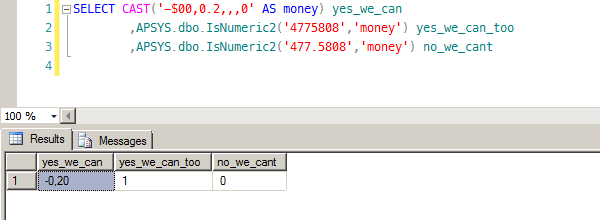Bad design
If you create a database engine and provide a system type numeric, and a bunch of other types that are similar to this one (decimal, float, real, int, bigint, smallint), you expect software developers to use a system function ISNUMERIC() to validate some text (eg -0.001) as being numeric. Totally fine. But then you also say that money and smallmoney are also numeric types, and you leave a remark on MSDN about this.
ISNUMERIC returns 1 for some characters that are not numbers, such as plus (+), minus (-), and valid currency symbols such as the dollar sign ($). MSDN
Let us try and test the beast in action

As you can see, ISNUMERIC('-$00,0.2,,,0') returns 1. I am speechless.
Reinvent the wheel, shall we?
Sometimes you may need a normal more predictable text-to-numeric validation. And that's when we use the CLR.
public static SqlBoolean fnIsNumeric(SqlString field, string sqltype)
{
var result = new SqlBoolean(0); // default False
string errorMessage = string.Empty;
// Determine base type and any decimal precision parameters
if(sqltype==null)
return result;
var type = sqltype.ToString().Trim().ToLower();
var typePrecision = string.Empty;
if(type.Contains("(")) {
typePrecision = type.Substring(type.IndexOf("(") + 1).Replace(")", "").Trim();
type = type.Substring(0, type.IndexOf("(") );
}
try
{
switch (type)
{
case "bigint":
var sqlBigInt = new SqlInt64();
sqlBigInt = field.ToSqlInt64();
if (sqlBigInt.IsNull == false) result = true;
break;
case "bit":
if(field.Value.Contains("+") || field.Value.Contains("-")) {
result = false;
} else {
var sqlBit = new SqlByte();
sqlBit = field.ToSqlByte();
if (sqlBit.IsNull == false && (sqlBit == 0 || sqlBit == 1)) result = true;
}
break;
case "decimal":
case "numeric":
// Support format decimal(x,0) or decimal(x,y) where true only if number fits in precision x,y
// Precision = maximum number of digits to the left of the decimal point
// If decimal(x,y) supplied, maximum precision = x - y
var sqlDecimal = new SqlDecimal();
sqlDecimal = field.ToSqlDecimal();
if(sqlDecimal.IsNull == false)
{
result = true;
if (typePrecision.Length > 0)
{
var parameters = typePrecision.Split(",".ToCharArray());
if (parameters.Length > 0)
{
int precision = 0;
int.TryParse(parameters[0], out precision);
if (precision > 0)
{
if (parameters.Length > 1)
{
int scale = 0;
int.TryParse(parameters[1], out scale);
precision = precision - scale;
}
var x = " " + sqlDecimal.Value.ToString().Replace("-","") + ".";
string decPrecisionDigitCount = x.Substring(0,x.IndexOf(".")).Trim();
if(decPrecisionDigitCount.Length > precision) result = false;
}
}
}
}
break;
case "float":
var sqlFloat = new SqlDouble();
sqlFloat = field.ToSqlDouble();
if (sqlFloat.IsNull == false) result = true;
break;
case "int":
var sqlInt = new SqlInt32();
sqlInt = field.ToSqlInt32();
if (sqlInt.IsNull == false) result = true;
break;
case "money":
var sqlMoney = new SqlMoney();
sqlMoney = field.ToSqlMoney();
if (sqlMoney.IsNull == false) result = true;
break;
case "real":
var SqlSingle = new SqlSingle();
SqlSingle = field.ToSqlSingle();
if (SqlSingle.IsNull == false) result = true;
break;
case "smallint":
var sqlSmallInt = new SqlInt16();
sqlSmallInt = field.ToSqlInt16();
if (sqlSmallInt.IsNull == false) result = true;
break;
case "smallmoney":
var sqlSmallMoney = new SqlMoney();
sqlSmallMoney = field.ToSqlMoney();
if (sqlSmallMoney.IsNull == false) {
// Ensure that it will fit in a 4-byte small money
if (sqlSmallMoney.Value >= -214748.3648m && sqlSmallMoney.Value <= 214748.3647m) {
result = true;
}
}
break;
case "tinyint":
var sqlTinyInt = new SqlByte();
sqlTinyInt = field.ToSqlByte();
if (sqlTinyInt.IsNull == false) result = true;
break;
default:
errorMessage = "Unrecognized format";
break;
}
}
catch (Exception)
{
if (string.IsNullOrEmpty(errorMessage) == false)
{
result = SqlBoolean.Null;
}
}
return result;
}
We try to convert the string to the specified type. If all goes well, we return a yes.
Test run
The script
DECLARE @value table (value varchar(1000))
INSERT INTO @value SELECT '$'
INSERT INTO @value SELECT '999'
INSERT INTO @value SELECT '-999999'
INSERT INTO @value SELECT '999.999'
INSERT INTO @value SELECT '-999.999'
INSERT INTO @value SELECT '-9999999.999'
INSERT INTO @value SELECT '-0'
select value,
SYSDB.dbo.IsNumeric2(value,'bit') as IsBoolean,
SYSDB.dbo.IsNumeric2(value,'BigInt') as IsBigInt,
SYSDB.dbo.IsNumeric2(value,'Int') as IsInt,
SYSDB.dbo.IsNumeric2(value,'SmallInt') as IsSmallInt,
SYSDB.dbo.IsNumeric2(value,'TinyInt') as IsTinyInt,
SYSDB.dbo.IsNumeric2(value,'Decimal') as IsDecimal,
SYSDB.dbo.IsNumeric2(value,'Numeric') as [IsNumeric],
SYSDB.dbo.IsNumeric2(value,'Numeric(10,3)') as [IsNumeric(10,3)],
SYSDB.dbo.IsNumeric2(value,'Numeric(10,0)') as [IsNumeric(10,0)],
SYSDB.dbo.IsNumeric2(value,'Numeric(11,0)') as [IsNumeric(11,0)]
FROM @value
results in

The function works exactly as expected. If you find it useful, download here.
Obscurity
One could imagine, that proposed sqlMoney = field.ToSqlMoney() would interpret '-$00,0.2,,,0' as SQL money.
But SQL money stores only normal decimal values. See for yourself:

MSSQL shatters one's dreams. SqlString.ToSqlMoney() won't accept dollar sign or dot. The logic might depend on language settings. But that is just too much for today.

More obscurity
Read SQL Server Data Type Mappings – see how SQL Server money becomes .NET Framework Decimal and has SqlDbType Money, yet DbType is still Decimal. Adventures await!